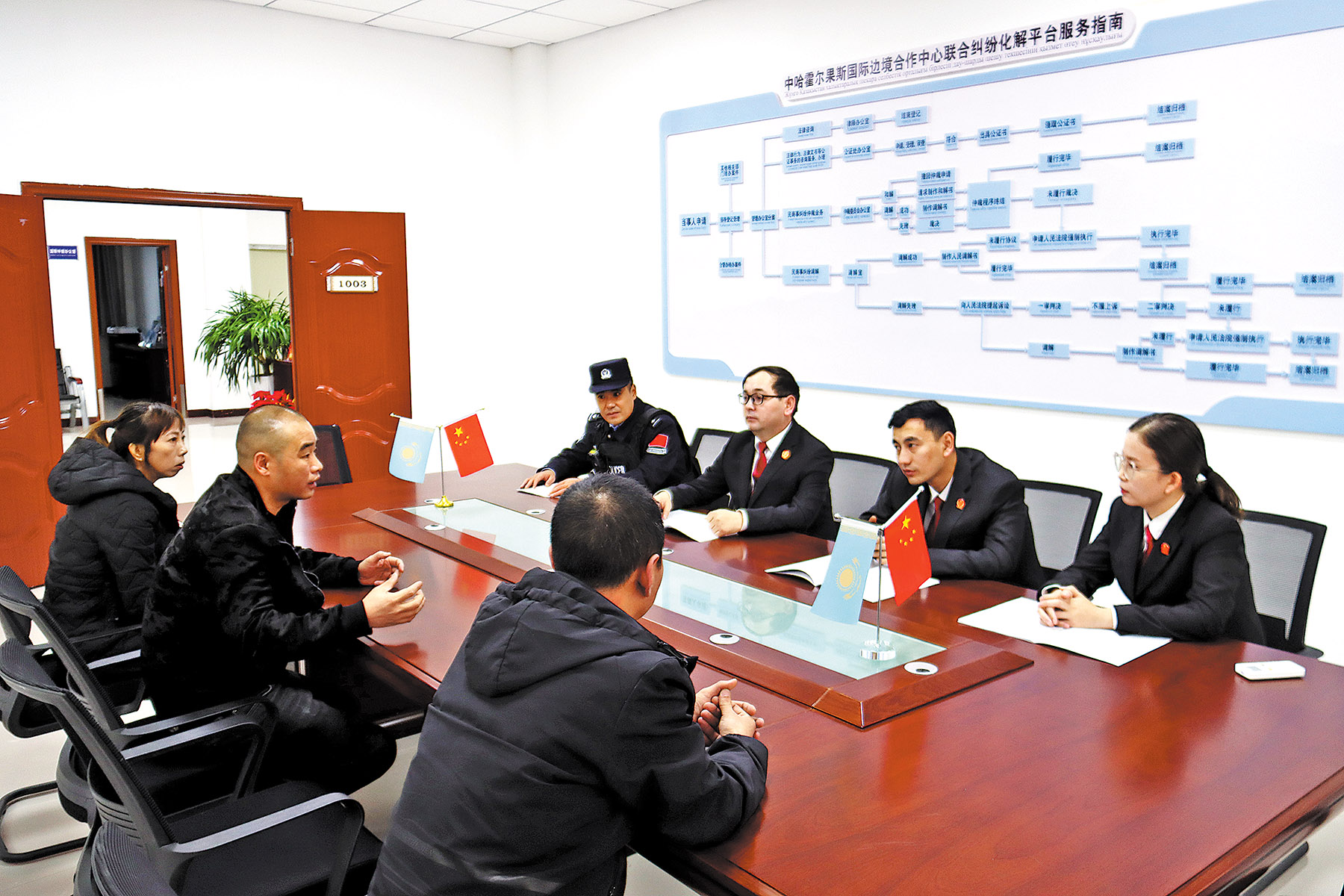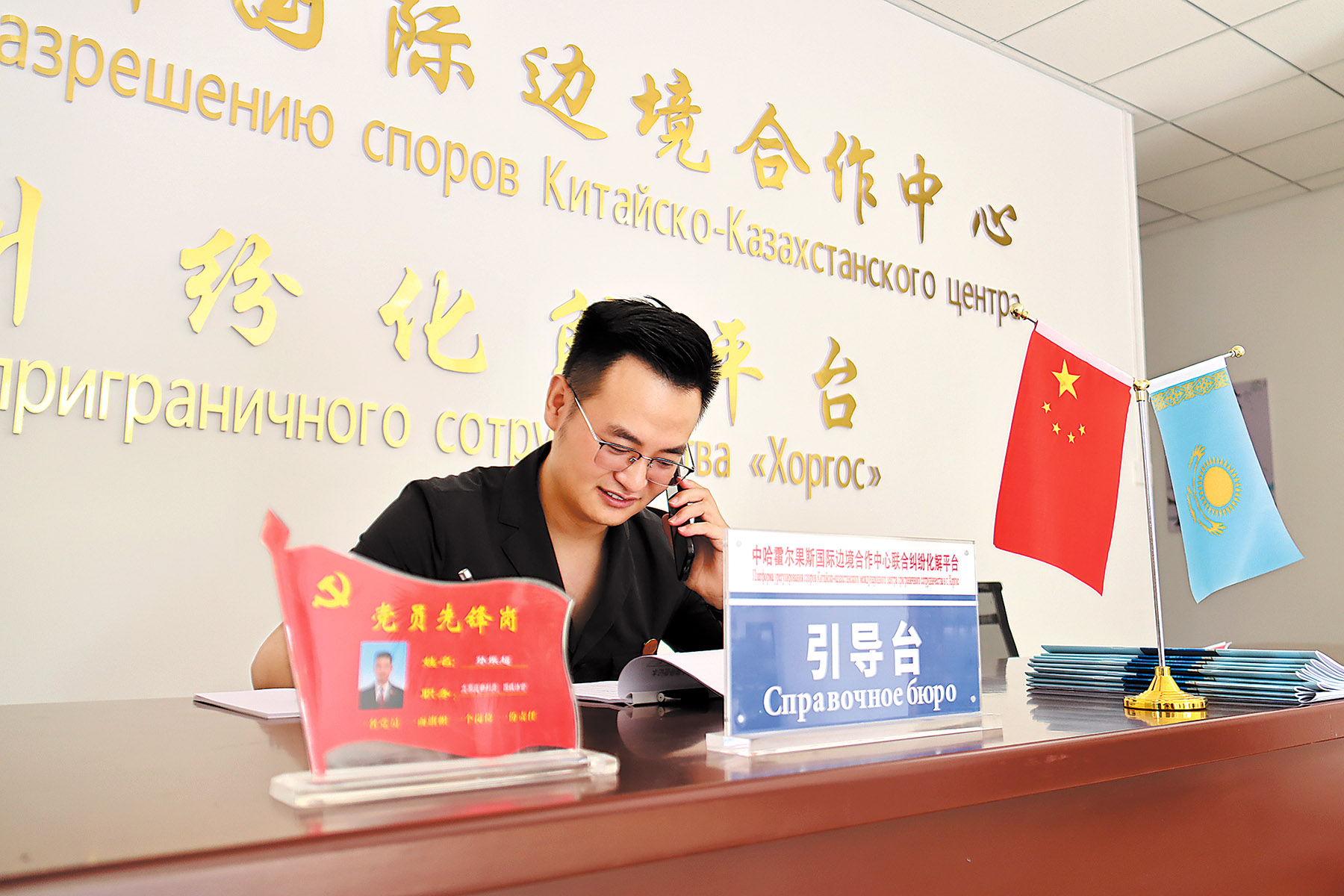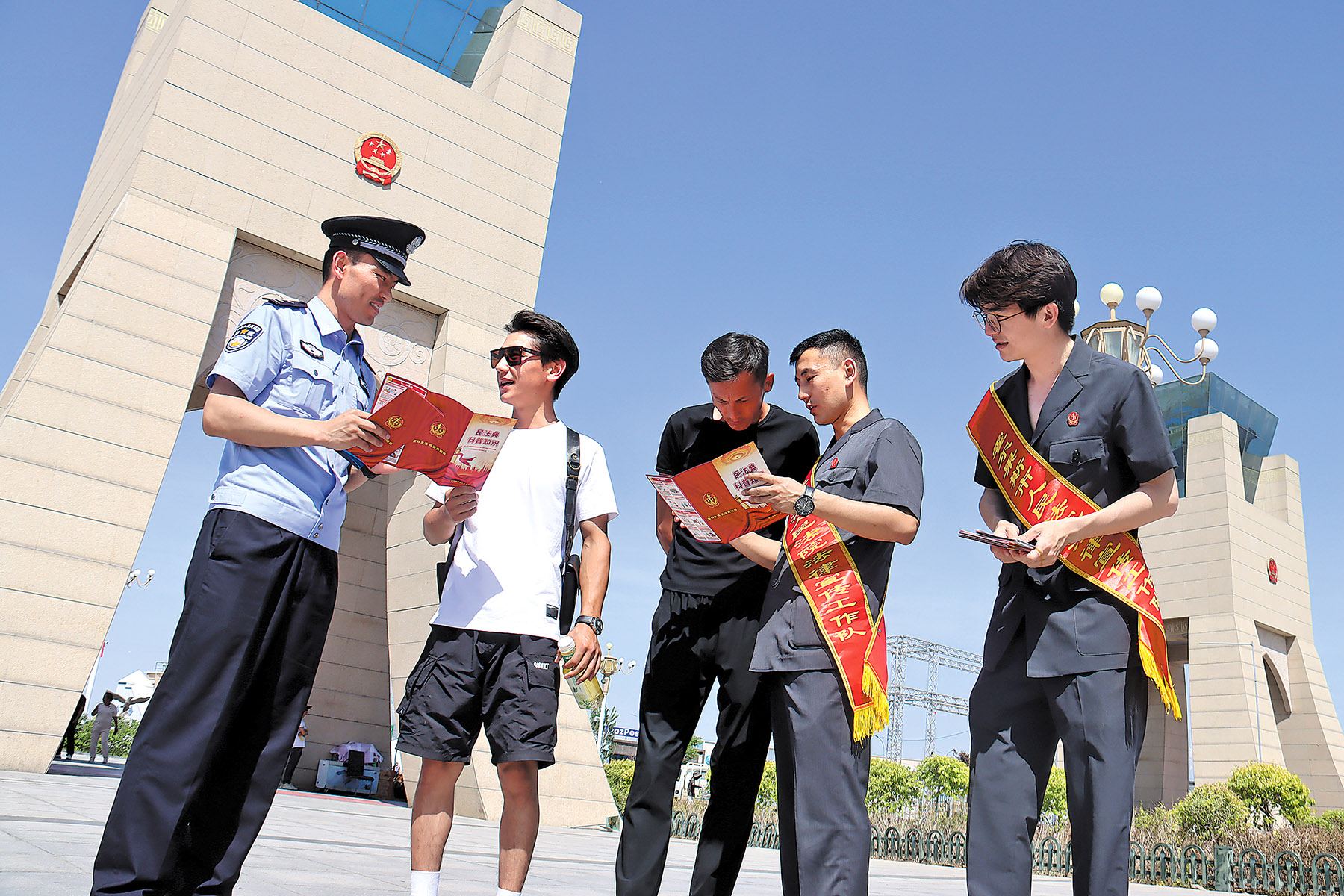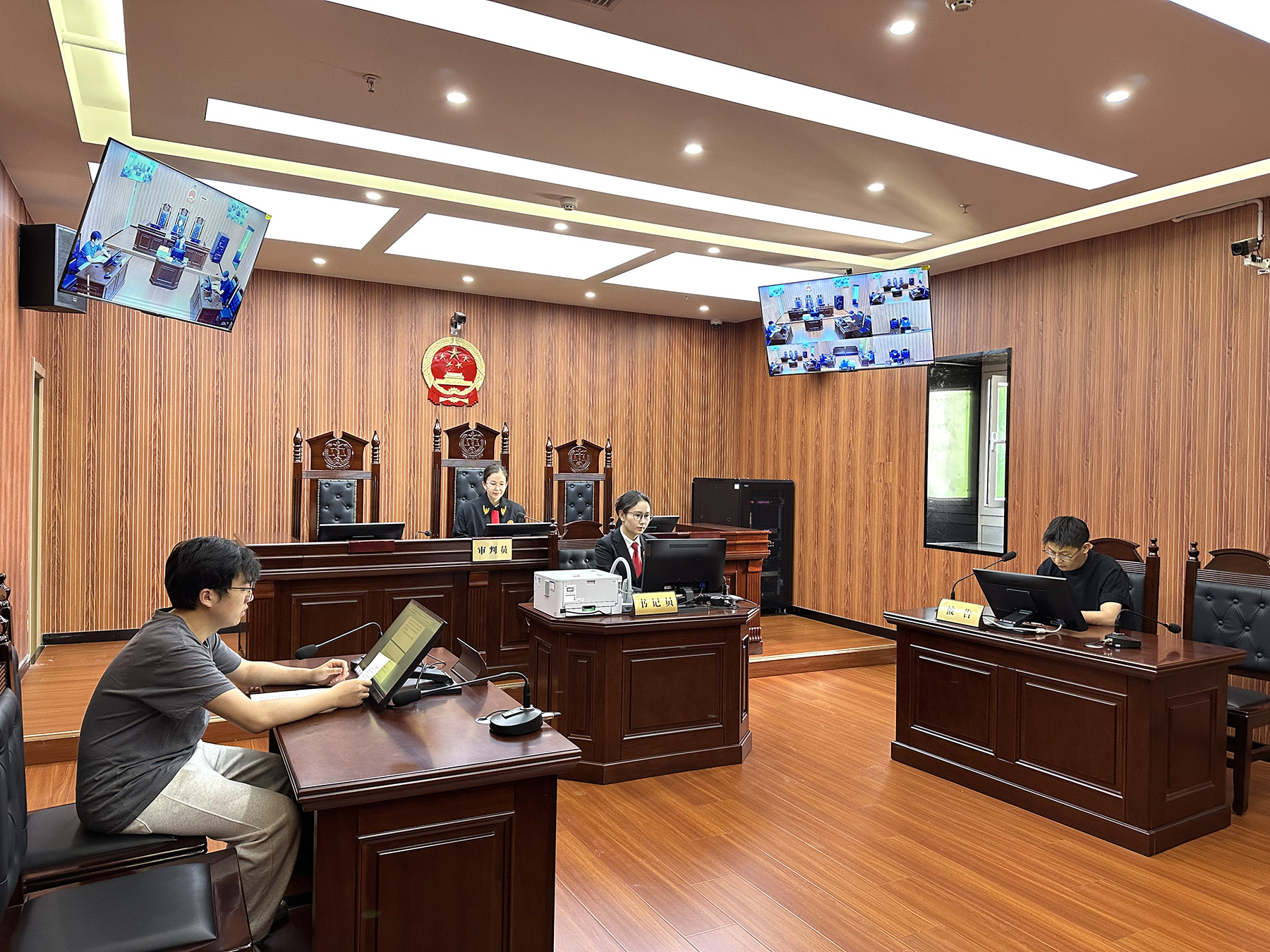Tribunals located in Xinjiang Uygur autonomous region's FTZ areas facilitate mediation of disputes

For lawyers like Amanjol Beken, working in Horgos, an important border city in the Xinjiang Uygur autonomous region, providing legal advice to businesses and individuals from Kazakhstan has become commonplace.
Recently, he has been assisting a Kazakhstani logistics company that is in a contract dispute with a Horgos firm over transporting vehicles to Uzbekistan for 250,000 yuan ($35,100). Despite receiving a 100,000 yuan deposit and completing the job, the Kazakhstani company has yet to receive the remaining payment from the Chinese side, so it turned to Amanjol, who is fluent in the Kazakh language and well-versed in Chinese law.
"With the rise of international trade, I handle at least four or five consultation calls like this every day," Amanjol said. His experience demonstrates the growing need for legal assistance in handling foreign-related issues in Horgos, a critical hub linking China and Central Asia.
"Even though my workload has increased, my efficiency in resolving disputes has improved, and I feel more fulfilled due to the more diverse and accessible legal services available in Horgos," he said.
READ MORE: BRI legal aid association formed
Situated on the China-Kazakhstan border, Horgos is a comprehensive, multi-functional port that combines road, rail, pipeline, air, optical cable and mail services, facilitating frequent business exchanges.
Last year, the port saw 1.37 million inbound and outbound trips, a 90 percent increase from the previous year, and exported 421,000 vehicles, marking a 38.6 percent year-on-year rise, setting a new record. Additionally, 8,730 China-Europe freight trains passed through the port last year, transporting 12.08 million metric tons of cargo, reflecting increases of 12.5 percent and 10.9 percent, respectively, compared to 2023, according to port management data.
To boost international trade, the China (Xinjiang) Pilot Free Trade Zone, covering areas in Urumqi, Horgos and Kashgar, opened in November 2023, helping to advance the development of a "golden corridor "between Asia and Europe.
To face the surge in foreign-related civil and commercial cases due to increasing business activities, Xinjiang has established three dedicated tribunals in these areas. The one in Horgos opened in December last year, and is already playing a considerable role in offering high-quality legal services to support high-level opening-up.

Resolving disagreements
In June, the tribunal in the Horgos area successfully mediated a vehicle purchase dispute between a Kazakhstani and a Chinese individual, earning praise from both parties.
In 2023, the Kazakhstani buyer agreed via WeChat to purchase a car from the Chinese seller for 230,000 yuan, making an initial payment of 114,500 yuan. The agreement specified that the balance would be paid by July 2024. However, the Chinese seller failed to deliver the vehicle, prompting the Kazakhstani buyer to file a lawsuit with the tribunal in April.
Reflecting on the case, Amanjol, the lawyer for the Kazakhstani party, said that he and his client found the legal services more accessible during the case proceedings.
"The tribunal opened a fast channel for foreign litigants, streamlining case filing, material review and hearings. It also assigned staff fluent in foreign and ethnic languages to facilitate communication," he said.
"These measures not only improved the case handling efficiency but also infused a strong sense of humanity into the judicial process for both my client and me," he added.
In addition to these services, Wu Guoquan, an official from the Horgos People's Court, said that they have selected people's assessors with expertise in trade, finance and logistics to participate in hearings of foreign-related cases, aiding judges in improving the quality of adjudication.
Entrepreneur Li Xiangfeng, with over 30 years of experience in international trade, is one such assessor. Her practical experience has provided valuable insights for resolving foreign-related issues and offered judges auxiliary references to accurately address the root causes of commercial disputes.
"I've witnessed the judiciary's commitment to serving the people over the past four years as an assessor. It's an honor to help identify substantive issues behind disputes and assist judges in resolving trade conflicts more swiftly," she said.
Lyu Ting, another official from the Horgos court, said plans are in place to attract more experts with business backgrounds and language skills like Li to enrich the assessor team.
She added that there will be collaboration with academic institutions to enhance research on foreign treaties and commercial laws, so as to further strengthen the judicial capacity to handle foreign-related issues and offer more personalized legal services to litigants.
According to data from the tribunal, it has heard 226 civil and commercial cases, 105 of which involved foreign matters, since its launch.

Greater efficiency
In March, a tribunal dedicated to tackling foreign-related civil and commercial cases was established in the Urumqi area of the FTZ as a division of the city's Xinshi District People's Court.
Shortly after its establishment, the tribunal resolved a dispute between an Uzbekistani businessman and a Chinese counterpart in just 45 days through mediation.
In May 2023, the Uzbekistani businessman supplied steel wires worth 108,500 yuan to the Chinese businessman. However, upon delivery to Urumqi, the Chinese party claimed the goods were lost due to logistics issues and withheld payment. The Uzbekistani traveled to Urumqi to demand the money and received a commitment from the Chinese businessman to settle the debt by the end of March 2024.
Despite multiple payment requests, the Chinese businessman continued to delay, prompting the Uzbekistani to file a lawsuit with the district court in April.
"China and Uzbekistan are key partners in investment and trade, so we approached this case with the traditional Chinese cultural values of mutual trust and benefit," said Wang Zhidong, vice-president of the court.
Considering the differences in language, laws and business practices between China and Uzbekistan, Wang said the Urumqi tribunal implemented innovative measures within the legal framework to minimize business losses for both parties and accommodate the foreign entity.
For instance, it assigned staff proficient in the Uzbek language to eliminate language barriers and facilitated the Uzbekistani party's appointment of a Chinese lawyer via video link, saving time and travel expenses.
It verified the undisputed payment amount and reviewed the compensation claims made by the Uzbekistani party, ultimately reaching an agreement to reduce the claimed liquidated damages, Wang said.
He added that resolving the dispute through mediation and in a timely manner would help restore trust for future cooperation between the two businessmen.
"The prompt resolution of the issue without leaving the country highlights the efficiency and fairness of China's judicial system," the Uzbekistani party said in May after receiving the mediation agreement.
Halbuwi Rozi, the lawyer for the Uzbekistani businessman, said that the judicial process outpaced similar cases she had dealt with in the past. "These advancements have revolutionized transnational litigation, showcasing the unparalleled professionalism of our nation's judiciary in handling foreign-related cases and elevating our international judicial standing to new heights," she said.

Increasing caseloads
Central Asia is the birthplace of the Belt and Road Initiative. As the initiative progresses with high-quality development, trade between China and Central Asian nations continues to expand. This comprehensive, multi-sector cooperation is advancing steadily, resulting in a rise in foreign-related cases and a growing diversity in legal needs.
According to the Xinjiang High People's Court, the number of foreign-related civil and commercial cases accepted by courts across the region increased from 112 in 2021 to 226 last year. From Jan 1 to Sept 13 this year, the number of such cases reached 283, primarily concentrated in economically developed and open areas such as Horgos and Urumqi.
Tan Ting, chief judge of the high court's first civil division, said that the tribunals in the FTZ's three areas will leverage their resources and location advantages to optimize legal services, working with other authorities to promote the high-quality development of initiative and high-level opening-up.
ALSO READ: Lam promotes HK’s legal services in Xinjiang to boost ties
Wu, from the Horgos court, said that it will further innovate its working mechanisms to effectively prevent and resolve foreign-related cases, positioning itself as a preferred venue for international commercial dispute resolution.
Beyond these tribunals, Xinjiang has also introduced additional services to meet the growing legal demand. In July 2021, a China-Kazakhstan joint dispute resolution platform was launched, where domestic and foreign market entities can access mediation, legal consultation and notary services.
In August last year, an international legal service zone began operations in Horgos, aimed at providing research on foreign-related legal matters and handling international affairs. So far, it has housed 26 institutions, including law firms, mediation organizations, international arbitration bodies and intellectual property agencies.
Contact the writer at caoyin@chinadaily.com.cn


